
This is my page-by-page synopsis of the recently recalled picture book, A Birthday Cake For George Washington. The text of the book is copyrighted by the author, Ramin Ganeshram, and the illustrations by the illustrator, Vanessa Brantley-Newton, and I will try to reproduce as much of the flavor of the book as I can without running afoul of those copyrights. I believe that the debate around this book is an important one, and that it is therefore all the more important that it be as informed a debate as possible, especially now that the book itself is no longer available.
If you’re one of the copyright holders and you believe I’ve gone too far with anything in this post, please contact me directly at contact@AuthorFreeman.com.
If anyone has, or has read, a copy of the book and feels I’ve misrepresented it or failed to adequately represent it in any way, please do contact me as well.
For those who might be interested, here’s my own review of the book.
A Birthday Cake For George Washington
|
Scene 1 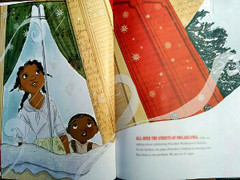 It’s Washington’s birthday and Delia’s (the protagonist’s) father (“Papa”) is baking a cake, but there’s no sugar. [Note: all the photos of the book interior are super low resolution (240×180 pixels, which would come out to less than one half a square inch if printed at normal print quality) with the text extra blurred on top of that. My intent was to show just enough to convey the visual feel of the book, which has been a key point in many discussions of it.] |
|
Scene 2 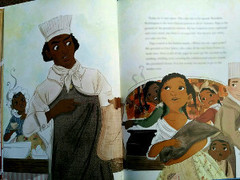 Papa’s very upset about the lack of sugar, and it’s too stormy outside for anyone to go buy more. “Today he is very upset. This cake has to be special. President Washington is the most famous person in all of America. Papa is the general of the president’s kitchen.” “Papa roared at the kitchen maids–Where has the sugar gone?!” |
|
Scene 3 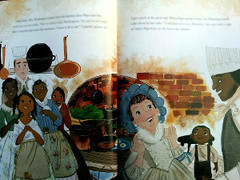 Papa reassures Mrs. Washington that all will be well. “Only when Mrs. Washington comes into the kitchen does Papa turn his scowl into an easy smile. ‘Not to worry, Lady Washington,’ he says in his voice that is smooth and sweet like molasses. ‘Leave it all to me.'” “Papa bows as she leaves the kitchen.” |
|
Scene 4 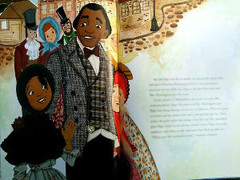 Papa’s situation as a slave is laid out:
|
|
Scene 5 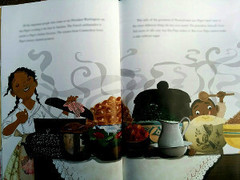 Lots of VIP’s (ambassadors, senators, etc.) love Papa’s food. Specific dishes are listed (“buttery mashed potatoes”, “chicken fricassee”) but then the narrative returns to the problem of no sugar. |
|
Scene 6 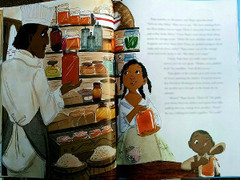 Papa searches the pantry for sugar and finds many fancy foods imported from various nations, but no sugar. He calls out these findings in a “booming” voice to Delia, but she “know[s] Papa does not really expect me to answer, so I do not speak.” Then he notices the many pots of honey, which is one of Washington’s favorite foods. “‘Now!’ he says, rubbing his hands together, ‘To work!'” |
|
Scene 7 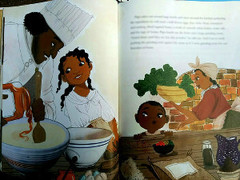 Papa “races around the kitchen” getting to work on the cake, and asks Delia to grind some dried fruit. “And I set to work pushing the grinding rock against the stone as if I were grinding corn for our hoecakes at home.” |
|
Scene 8 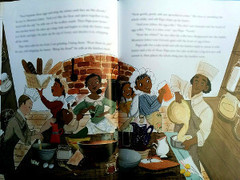 Papa issues further orders to the other chef (a Frenchman) and to Delia and the servants, as the ingredients for the cake are prepared and combined, step by step. “Papa then calls for the fruits I am grinding. I bring them. ‘Pour them in, girl,’ he says, still whipping the butter. ‘Bring the flour!” he yells at the kitchen maid.” Finally, the batter is poured into a mold and the mold put into the oven. |
|
Scene 9 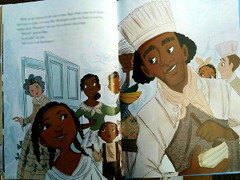 As Papa prepares the frosting, Mrs. Washington “pokes her head around the kitchen door” to ask if everything is going well, and he assures her that is it. |
|
Scene 10 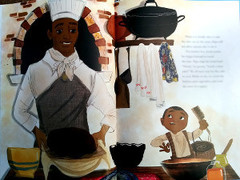 When the cake is done, Papa won’t let anybody else take it out of the oven. “The kitchen boy slowly pokes his finger forward to touch the cake. Papa slaps his hand hard. ‘Never,’ he growls, ‘touch a risen cake!” While waiting for the cake to cool, everybody goes back to work on cleaning up or on preparing the rest of the meal. |
|
Scene 11 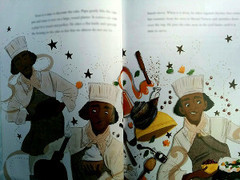 Papa decorates the cake so dexterously “that we almost do not see his hands move.” He tops it with some Mount Vernon cherries and sets it aside. |
|
Scene 12 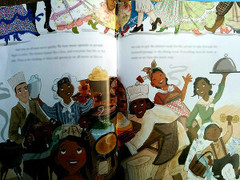 Guests begin to arrive and “the kitchen buzzes like a hive” as the servants prepare to serve the dinner. |
|
Scene 13 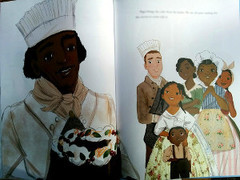 Papa brings out the cake for a server to bring into the dining room. |
|
Scene 14 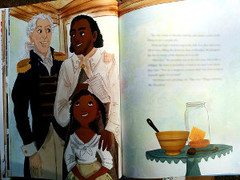 When the platter comes back, the kitchen staff sees that the entire cake has been eaten. “Then we hear a heavier step in the hall. It is slow and even. All at once, filling the doorway, there is President Washington.” “‘Hercules,’ the president says in his soft voice that is like a whisper…’You are a magician, a master chef. You have outdone yourself again. Good man.'” |
Jacket Text
[Note: I am reproducing the jacket text, the author’s note, and the illustrator’s note in full. If you’re one of the copyright holders and you object to this, then again, please contact me and I’ll change these sections to be like the previous ones: summaries in my own words augmented with selected excerpts. I hope you’ll allow me to keep these sections as they are, however, since they are so critical to understanding your intentions for this book.]
Everyone’s buzzing about the president’s birthday! Especially George Washington’s servants, who scurry around the kitchen preparing to make this the best celebration ever. Oh, how George Washington loves his cake! And, oh, how he depends on Hercules, his head chef, to make it for him. Hercules, a slave, takes great pride in baking the president’s cake. But this year there is one problem—they’re out of sugar.
This story, told in the voice of Delia, Hercules’s young daughter, underscores the loving exchange between a very determined father and his eager daughter, who are faced with an unspoken, bittersweet reality. No matter how delicious the president’s cake turns out to be, Delia and Papa don’t have the sweetness of freedom.
Author’s Note
We all know George Washington as the “Father of Our Country” and the first president of the United States. In his own lifetime, Washington was the most famous American alive. All over the world he was the face of the new nation, the “hero of the republic.”
Because George Washington was so well loved, his birthday was celebrated by Americans even while he was still leading patriot troops in the War for Independence. By the time Washington became president, Americans were celebrating his birthday with balls, parties, fireworks, and parades.
The president’s cook, Hercules, was also a real person who was famous in his own right. It is true that he was well known throughout Philadelphia for his love of nice clothes and how well respected he was by the Washingtons. He wore a fancy waistcoat and had a gold watch. He also wore a top hat and was generally known for being very fashionable. He insisted on perfection in the kitchen and was known to have a temper with those who did not obey.
George and Martha Washington gave Hercules these gifts because he was such a great chef. Hercules was quite proud of his status in the Washington home, and he lived a life of near-freedom. But as the Founding Fathers knew, being almost free is not the same as being free, and he dreamed of his own liberty.
Hercules is often thought of by culinary historians as the first celebrity chef in America. The cake he makes for the president in this book is based on a cake that was often made in the Washington home: Martha Washington’s Great Cake.
George and Martha Washington owned more than three hundred slaves, who worked both at Mount Vernon—their Virginia home—and at the President’s House in Philadelphia. While Hercules did have a daughter named Delia, who would have been roughly twelve years old at the time of this story, around 1796, she does not seem to have ever worked at the President’s House in Philadelphia. However, Hercules’s son, Richmond, who was a teenager, did work as a “scullion,” or kitchen servant, with his father. This was a favor that President Washington granted to Hercules because of his esteem for the cook—not because, according to the president, Richmond seemed particularly good for the job.
Whether or not slavery was wrong was a question that Washington could not easily answer for himself. He needed slave labor to run his plantation—the source of his income and rich lifestyle. But as the years went on, he began to see more and more that it was evil to keep fellow human beings in bondage, and he became more and more lenient with his slaves. Eventually, he granted freedom to his slaves in his will.
Still, while they lived in Philadelphia, both President and Mrs. Washington were very worried about their slaves taking advantage of a Pennsylvania law that gave slaves their freedom if they remained in the state for longer than six months. The Washingtons often took their slaves—including Hercules—with them on trips out of the state to “reset” their time in Pennsylvania——keeping them enslaved.
At the end of 1796, Hercules and Richmond were sent back to Mount Vernon after Richmond was caught stealing money from a white servant. Washington assumed that the money was being stolen in order to help Richmond and Hercules escape. The president sent father and son back to Mount Vernon for “safekeeping.”
A few months later, Hercules did escape from Mount Vernon—in the early morning hours of February 22, 1797. It was President Washington’s sixty-fifth birthday. Delia, the narrator of this book, remained enslaved even after President Washington died, because she was owned by Martha Washington, who did not free her slaves. We do not know of her fate in the years following, but as of the death of Martha Washington in 1802, Delia and her siblings remained enslaved. –RAMIN GANESHRAM
Illustrators Note
I’ve always been fascinated with history, especially as it relates to people of color and their contributions to the lives of American leaders. As an artist, I enjoy mixing media to tell a story. In the case of A Birthday Cake for George Washington, I conducted research on the clothing, furniture, and kitchen items of the time period. While my illustrations reflect this research in the setting, I deliberately chose to render certain aspects of Delia and Hercules’s world with a mix of historical artifacts and modern references. To engage young readers, some items—bowls, pitchers, jars, pots—are depicted through the use of contemporary photographic images placed among my historically themed drawings. This was intentional, to serve as a means for making the setting come alive for today’s children. As for the food depictions, these were also researched. Leafy greens would not have been in abundant supply in the colder months, but they were among the crop selections during that time period. While slavery in America was a vast injustice, my research indicates that Hercules and the other servants in George Washington’s kitchen took great pride in their ability to cook for a man of such stature. That is why I have depicted them as happy people. There is joy in what they have created through their intelligence and culinary talent. —VANESSA BRANTLEY-NEWTON
